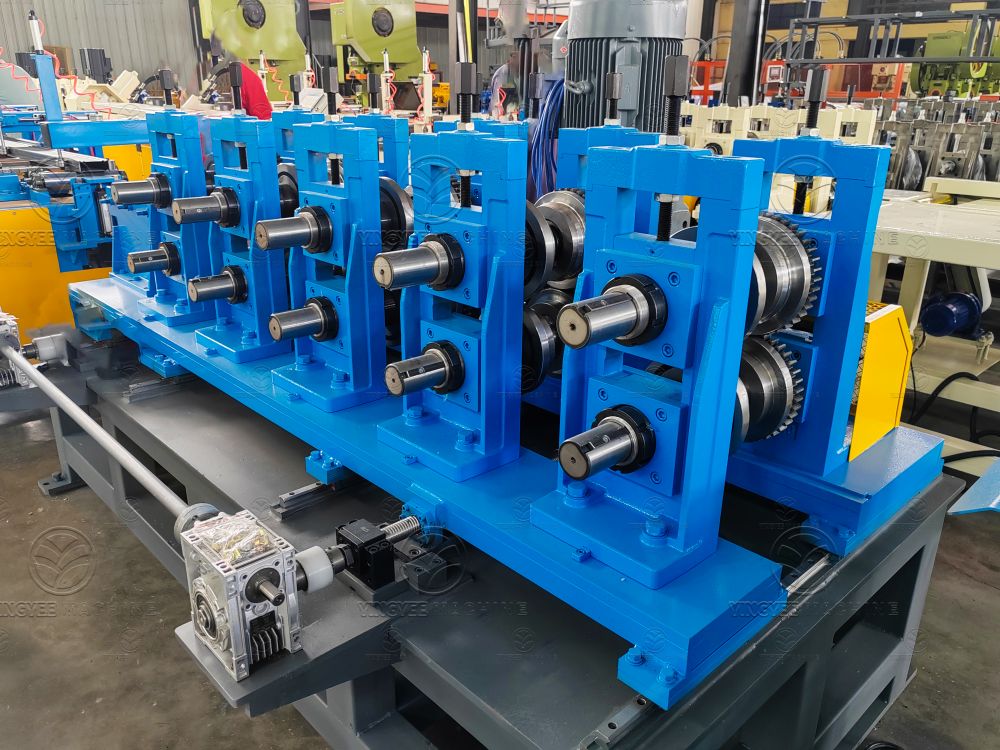
Understanding C-Channel Forming Machines A Comprehensive Overview
C-channel forming machines are essential tools in the manufacturing and construction industries, designed to create C-shaped channels from rolled metal sheets. These machines play a pivotal role in producing various structural components used in framing, supporting, and providing stability in buildings and other structures. This article explores the working principles, types, applications, and advantages of C-channel forming machines.
Working Principles of C-Channel Forming Machines
The C-channel forming process begins with feeding metal sheets, typically made from mild steel, into the machine. These machines employ a series of rollers that shape the flat sheet into a C-channel profile. The process typically includes several stages
1. Feeding The flat metal strip is fed into the machine using a conveyor system. Proper alignment is crucial to ensure accurate formation.
2. Roll Forming As the metal passes through a set of rollers, each set progressively bends the material into the desired C shape. The rollers are specifically designed and positioned to exert precise pressure at each stage.
3. Cutting Once the metal has been formed into the channel, it is cut to the required length. This process may involve different cutting techniques, including shearing or flying cut-offs.
4. Finishing Post-cutting processes may include deburring and surface treatment to enhance the material's finish and ensure it meets industry standards.
Types of C-Channel Forming Machines
There are various types of C-channel forming machines, ranging from semi-automated to fully automated systems, each catering to different production needs
1. Manual Forming Machines These are basic machines that require manual operation. They are suitable for low-volume production and prototyping.
2. Hydraulic Forming Machines Utilizing hydraulic power, these machines can apply higher forces for shaping thicker materials. They provide enhanced flexibility in terms of the types of metals processed.
3. CNC Forming Machines Computer Numerical Control (CNC) machines offer precision and efficiency for high-volume production. They can be programmed to produce various lengths, widths, and thicknesses, ensuring uniformity across large batches.
4. Multi-Profile Forming Machines These versatile machines can produce various channel profiles, not just C-channels, making them suitable for manufacturers needing to switch between different types of products.

Applications of C-Channel Forming Machines
C-channel products find applications across a wide range of industries, including
1. Construction Used extensively in the construction of buildings, these channels are critical for structural support, roof framing, and wall studs.
2. Manufacturing C-channels are used in manufacturing machinery as structural supports and components, providing stability and strength.
3. Automotive In automotive manufacturing, C-channels serve as frame supports and structural elements, contributing to the vehicle's overall integrity.
4. Furniture C-channels are also used in furniture manufacturing, particularly in the construction of steel frames for tables, shelves, and other supportive structures.
Advantages of Using C-Channel Forming Machines
The integration of C-channel forming machines in manufacturing processes provides numerous advantages
1. Efficiency These machines automate the forming process, significantly increasing production speed and reducing labor costs.
2. Consistency Automation ensures uniformity in the produced channels, meeting quality control standards.
3. Versatility With various designs and configurations, C-channel forming machines can accommodate different sizes and materials, making them adaptable to changing production needs.
4. Cost-Effectiveness The initial investment in forming machines pays off through reduced material waste and lower labor costs in the long run.
Conclusion
C-channel forming machines are vital to the modern manufacturing landscape, enabling the production of strong, reliable, and cost-effective structural components used across various industries. Their ability to enhance efficiency and produce consistent quality products makes them an invaluable investment for manufacturers looking to optimize their operations. As technology continues to evolve, we can expect further advancements in C-channel forming machines, leading to even greater capabilities and applications in the future.